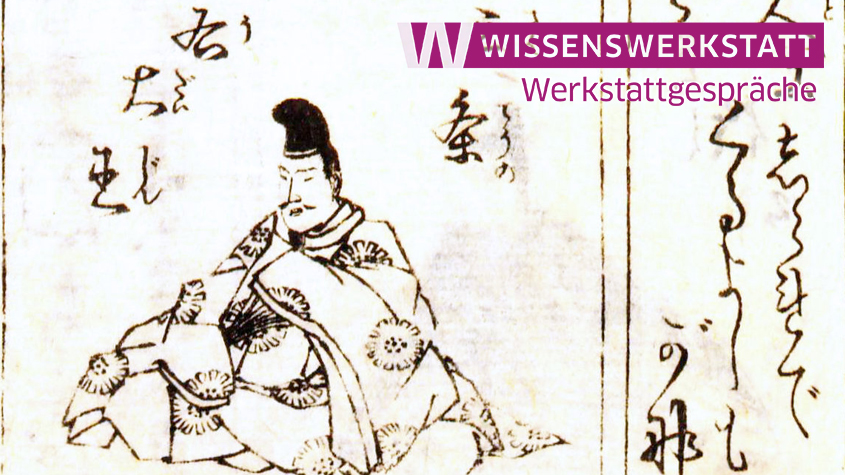Lecture by Dr. Freya Terryn: „Hyakunin isshu and the Hiroshige studio: Utagawa Hiroshige’s take on the classical Japanese anthology“
We hereby cordially invite you to the lecture „Hyakunin isshu and the Hiroshige studio: Utagawa Hiroshige’s take on the classical Japanese anthology“ by our former scholarship holder Dr Freya Terryn (KU Leuven, Belgium). The grant program of the Stiftung Preussischer Kulturbesitz enables visiting scholars from across the world to pursue their research at one of the Foundation’s institutions. In 2022 Dr. Terryn received financial aid through this grant program and conducted intensive research on one premodern Japanese book in our collection at the East Asia Department of Staatsbibliothek zu Berlin. She will introduce her analysis within the lecture series „Werkstattgespräche“.
Date: Thursday, 3rd November 2022
Time: 6.15 – 7.15 p.m (Berlin Time / Central European Time, CET/UTC+1, 30 minutes talk, 30 minutes Q&A)
Language: English
Access Link to WebEx Meeting (open about 5 minutes before the beginning of the lecture)
Dr. Freya Terryn
Hyakunin isshu and the Hiroshige studio: Utagawa Hiroshige’s take on the classical Japanese anthology
The classical Japanese anthology Hyakunin isshu (”One Hundred Poets, One Poem Each”) is since at least the 14th century Japanese literature’s preeminent collection of exemplary poems. It has exercised a tremendous influence on Japanese literature, culture, and visual art and knows a long history of textual and pictorial adaptations and appropriations. In particular, the development of the woodblock printing technique aided the wider circulation of its commentaries, illustrations, adaptations, and parodies to a wider and more diverse audience from the late seventeenth century onward. In this talk, I will introduce one example of such an adaptation: the illustrated book Hyakunin isshu jokunshō (“Annotated Lessons for Women of One Hundred Poets, One Poem Each”), first published in 1848 and illustrated by Utagawa Hiroshige (1797-1858). More precisely, this talk covers an 1858-reissue housed in the collection of the Staatsbibliothek zu Berlin and places it in the pictorialization history of Hyakunin isshu, in the tradition of instructional manuals for women (joshi yō ōraimono or jokunshō), and in the life and work of Hiroshige.
The analysis of this book is part of a research project that conducts a comparative study of how different artists of one studio represented Hyakunin isshu in woodblock-printed illustrated books. More specifically, this project examines the relationship between the Hiroshige studio and the anthology, focusing on two books illustrated by the master Utagawa Hiroshige (1797-1858) and his student Utagawa Hiroshige III (1842-1894).
Short biography:
Dr. Freya Terryn is a postdoctoral researcher in Japanese Studies at the University of Leuven (KU Leuven, Belgium) and specializes in Japanese visual and print culture of the nineteenth century. With the support of a PhD Fellowship from the Research Foundation Flanders, she recently completed her PhD in Japanese Studies at the University of Leuven. She currently teaches courses on Japanese culture, art history, classical Japanese grammar, translation from Japanese to Dutch, and academic writing. When it comes to research, she is enthusiastic about the arts and material cultures of eighteenth- and nineteenth-century Japan, with a particular focus on prints, illustrated books, and paintings. She also explores issues relating to artistic and commercial collaboration, the interaction between governing bodies and artists, pictorial quotation, exhibition culture, Japonisme, and the formation of Japanese art collections in Europe.
The illustration is taken from Hyakunin isshu jokunshō (百人一首女訓抄, printed 1858, reprint of the 1848 edition, shelf mark: 5 A 230984 ROA), the „Annotated Lessons for Women of One Hundred Poets, One Poem Each“ illustrated by Utagawa Hiroshige (1797-1858). It shows the poet and courtier Fujiwara no Sadakata (藤原定方, 873–932), who is also known as „Minister of the Right of Sanjō“ (Sanjō no Udaijin, 三条右大臣). Link to OPAC



